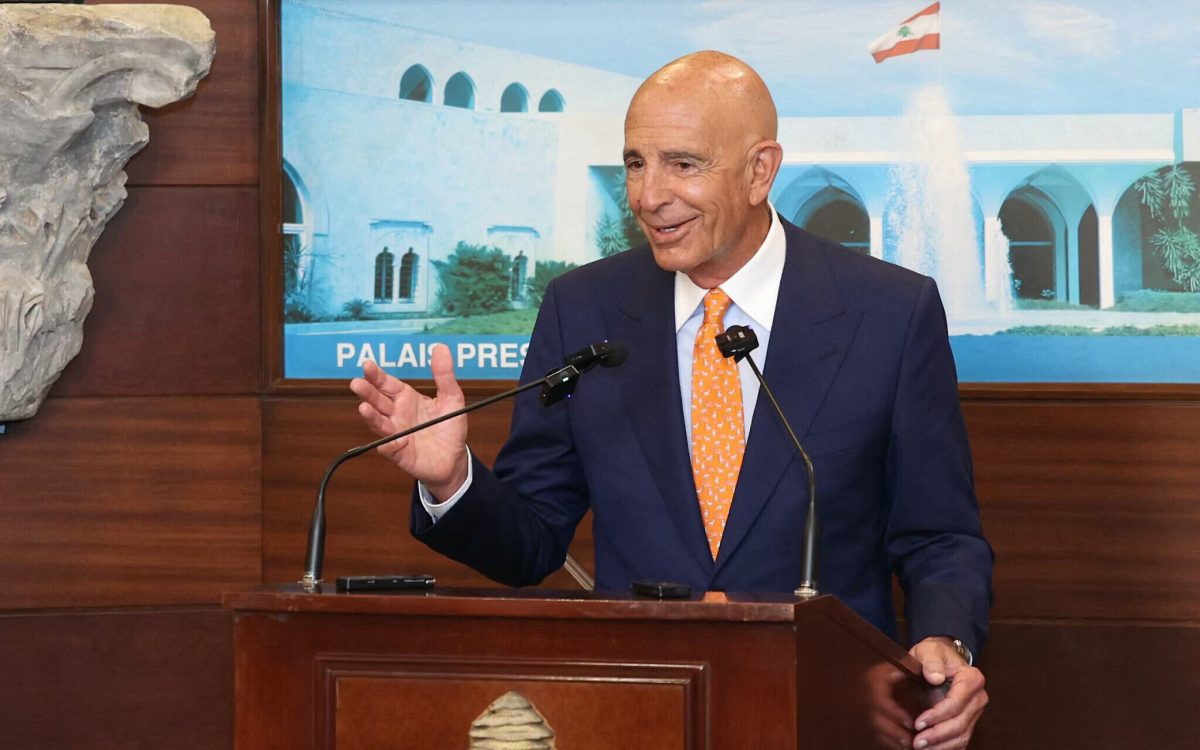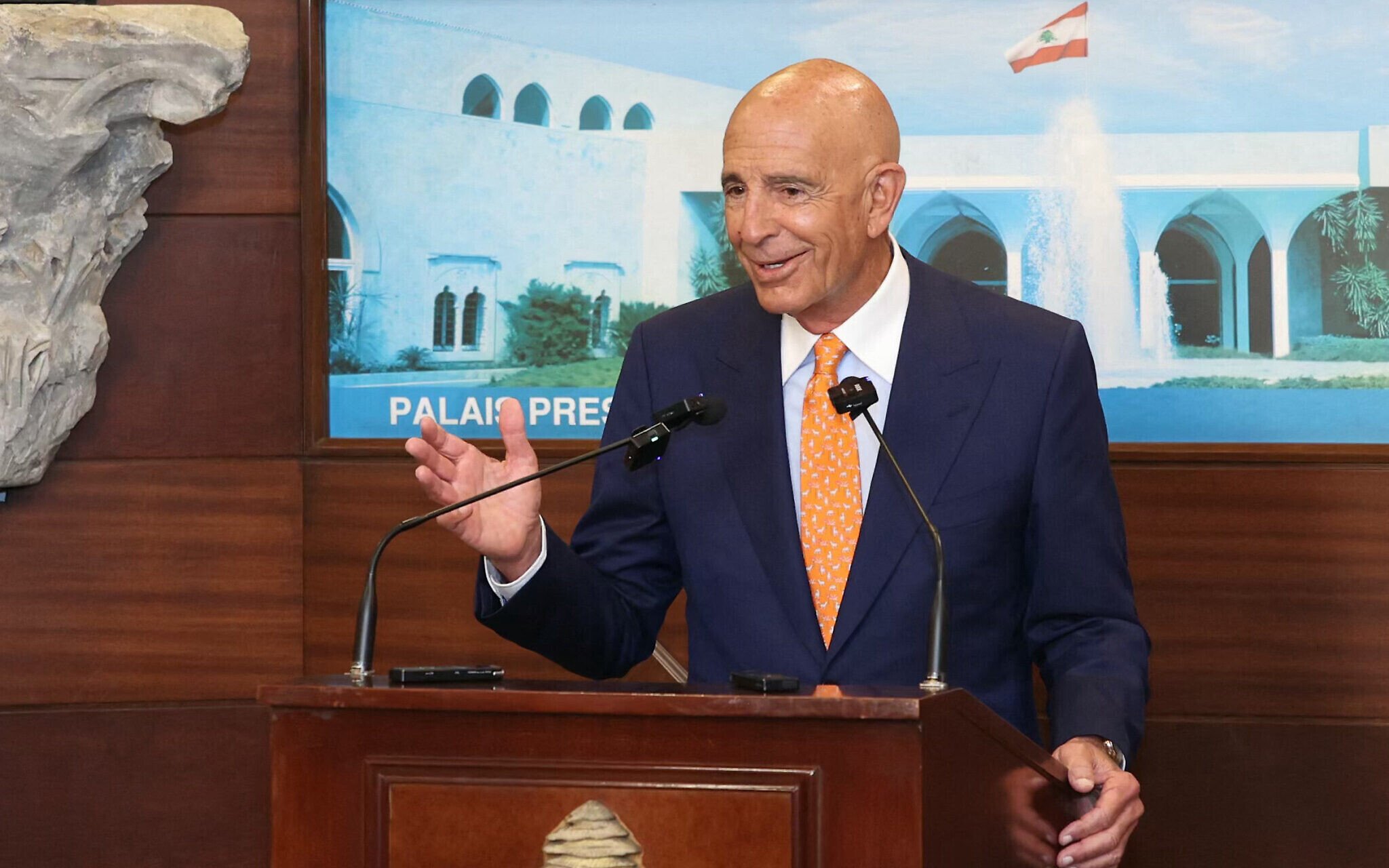
U.S. special envoy Thomas Barrack arrived in Beirut on Monday for the third time in just over a month, holding high-level talks with Lebanese officials on a proposed American roadmap aimed at stabilizing Lebanon and the wider region.
The plan, backed by the White House, calls for the disarmament of non-state armed groups, long-delayed economic reforms and improved diplomatic ties between Lebanon and Syria.
Barrack’s visit comes amid mounting domestic and international pressure on Hezbollah to relinquish its arsenal following a destructive war with Israel that ended under a U.S.-brokered ceasefire agreement in November 2024.
In Beirut, Barrack met Monday with President Joseph Aoun at Baabda Palace and Prime Minister Nawaf Salam at the Grand Serail. On Tuesday, he met with Parliament Speaker Nabih Berri at Ain al-Tineh.
“I’ve returned to Lebanon because President Trump is committed to regional stability, and Lebanon plays a key role,” Barrack told reporters after his meetings with Aoun and Salam. “We need to focus on it now to help restore security across the region. The ceasefire between Lebanon and Israel hasn’t held, and we’re working to address that.”
Barrack, a former real estate executive and longtime Trump adviser who lived in Beirut in the 1970s, emphasized Washington’s interest in seeing “security” and “economic prosperity” in Lebanon. Known for his close ties to Gulf rulers, Barrack said the Trump administration believes economic opportunity is a strong incentive for peace.
Asked whether the U.S. would guarantee an end to Israeli airstrikes on Lebanese territory, Barrack said Washington could only offer influence, not control.
“The U.S. has no business in trying to compel Israel to do anything. America’s intent in being in Lebanon is as a constructive friend to usher it to the next level of relevancy, which it deserves,” he said.
Lebanese Officials Submit Response
According to the presidency, Aoun handed Barrack a draft comprehensive memo outlining Lebanon’s commitments including those from the Nov. 27 declaration, the government’s ministerial statement and Aoun’s inaugural address. The document is meant to serve as Lebanon’s official response to the U.S. proposal.
Earlier this month, Barrack told reporters in New York that the U.S. was not concerned with Hezbollah’s small arms, but with larger systems like missiles and long-range rockets.
“Everybody in Lebanon is packing a .357 Magnum. I mean, it’s like having a belt. We’re not talking about small arms. We’re talking about the weapons that could affect Israel.”
On July 11, Barrack clarified that Washington’s concerns center on Hezbollah’s military wing, not its political ally Amal, which represents much of Lebanon’s Shia community in parliament.
Barrack also raised concerns about the situation in Syria, especially recent developments in Sweida and called for accountability from the government.
U.S. Roadmap Draws Mixed Reactions
Speaking to the Al-Jadeed channel on Sunday, Edward Gabriel, president of the American Task Force for Lebanon, warned that “time is running out” and expressed hope for a positive Lebanese response.
Meanwhile, Samir Geagea, head of the Lebanese Forces party, criticized what he described as the government’s silence in response to the U.S. initiative. Geagea said the proposal aims to end both Israeli violations and the presence of illegal weapons on Lebanese territory.
Barrack has insisted the Lebanese Army must be “properly trained as a peacekeeping force, not as a military offensive force.”
According to a Reuters report last month, the U.S. roadmap includes a four month timeline for Hezbollah to disarm in exchange for a halt to Israeli strikes and a full withdrawal of Israeli forces still occupying Lebanese positions along the southern border.
Lebanon has asked Washington to act as a guarantor to ensure that if Hezbollah begins to hand over its weapons, Israel will halt its operations and withdraw from remaining contested areas.
However, Barrack rejected the idea of any binding U.S. guarantees.
“There’s no consequence, there’s no threat, there’s no whip,” he said Monday. “The U.S. is not forcing Lebanon to disarm Hezbollah and we’re not threatening sanctions against Lebanese officials.”
Barrack, 78, also serves as U.S. ambassador to Turkey and special envoy for Syria.
Truce on Shaky Ground
Israel and Hezbollah fought a months-long war last year that ended with the U.S.-brokered truce calling for both sides to cease hostilities, for Israeli forces to withdraw and for the disarmament of all non-state actors in Lebanon, beginning in the south.
While Hezbollah has handed over some weapons to the Lebanese Army, Israel claims the group continues to violate the agreement by rebuilding its military infrastructure. Hezbollah, in turn, accuses Israel of breaching the deal by maintaining control of at least five strategic points along the Lebanese border and conducting ongoing airstrikes.
As Lebanon faces mounting pressure to disarm and comply with foreign-backed roadmaps, many see a dangerous double standard at play. Israel continues to violate the ceasefire and add to the already long list of alleged war crimes, while backed with arms and money by Western powers. Lebanon and Palestine are asked to give up the very tools they use to defend their land. Attempts to curb their ability to defend their territory amount to denying them the right to resist occupation. Many feel they are being asked to give up their only means of defense.
This is not diplomacy, critics argue, but coercion disguised as peace.
Until every nation’s right to security and sovereignty is respected, not just those aligned with the West, true stability in the region will remain out of reach.





